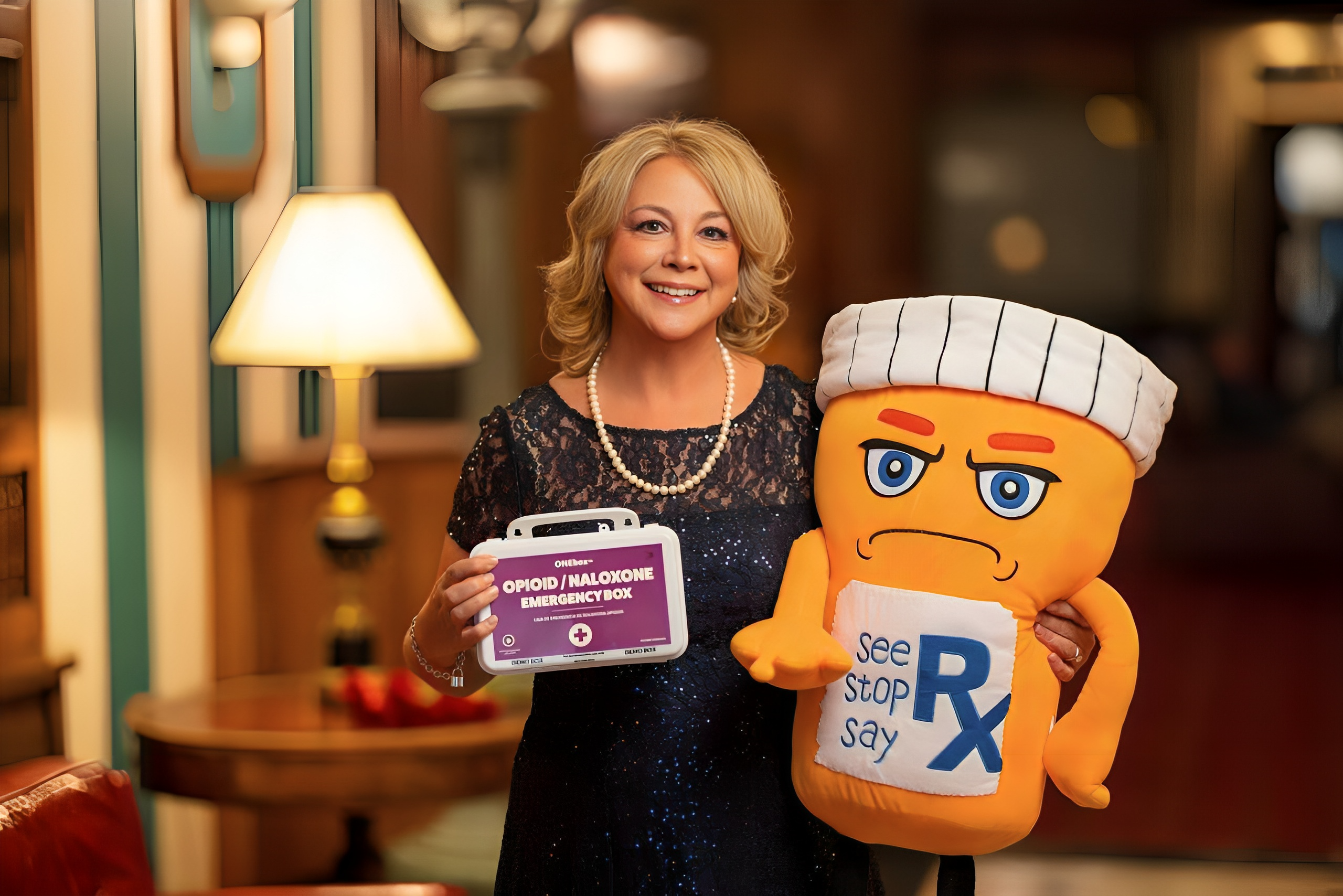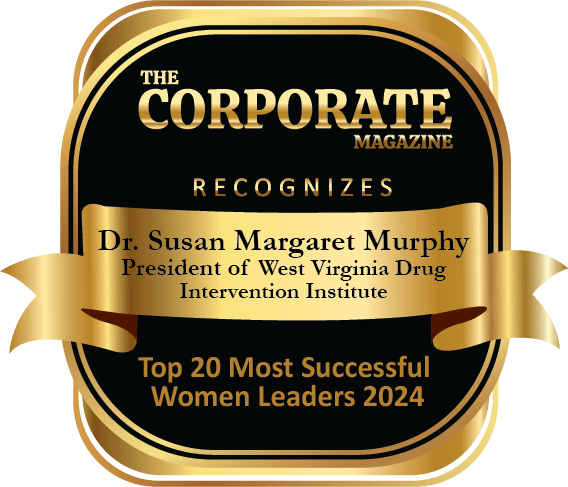Over six years, she was privileged to spearhead student-driven outreach initiatives, working closely with faculty and students to address pressing issues like medication safety and adherence. These efforts garnered recognition from esteemed organizations like the American Association of Colleges of Pharmacy, affirming the impact of our work in educating the public.
Yet, amidst these accomplishments, life took an unexpected turn. Like so many others in West Virginia, Dr. Susan found herself confronted with the devastating realities of the opioid epidemic when she became a firsthand witness to a fatal overdose. It was a moment that ignited within her a newfound resolve to confront the scourge of substance use head-on. In the spring of 2019, fueled by a commitment to her community, Dr. Susan stepped away from academia and embarked on a new chapter as the inaugural president of the West Virginia Drug Intervention Institute (DII). “It was a leap of faith, driven by a profound sense of duty to combat the epidemic ravaging our state and to honor the memory of those we’ve lost,” says Dr. Susan. “This transition marked a pivotal point in my life, one where my professional aspirations converged with a deeply personal calling. As I assumed leadership of the DII, I carried with me the lessons learned and the values instilled during my years in higher education—a steadfast dedication to service, a commitment to collaboration, and belief in the power of community-driven solutions.”
While the path forward may be fraught with challenges, Dr. Susan remains resolute in her conviction that by working together, they can overcome the grip of addiction and build a brighter, healthier future for all.
Becoming A True Leader
Throughout her academic journey, Dr. Susan’s focus has been on understanding the nuances of male and female communication styles—a topic that has always intrigued her. While she has delved into research and analysis, exploring how gender influences their interactions, she has come to realize that true leadership extends beyond these distinctions.
In leading organizations, Dr. Susan’s approach has been rooted in authenticity and integrity. “I don’t fixate on gender differences; instead, I prioritize competence, transparency, and compassion. Creating an inclusive environment where everyone feels valued and informed is paramount to me,” she says. “I believe in sharing knowledge openly, even if it may not immediately impact decision-making. It’s about fostering a culture of trust and accountability.”
Admittedly, there are times when assertiveness is necessary, even if societal norms may label it differently for women. But she has learned to embrace this assertiveness to drive progress and achieve goals effectively. “Setting clear expectations is key—both for myself and for those I work with. It ensures that everyone understands their role and responsibilities from the outset, minimizing the risk of disappointment or miscommunication,” adds Dr. Susan. “Ultimately, what matters most to me is building relationships built on honesty and mutual respect. Whether it’s with my board, my staff, or anyone else, I strive to communicate openly and transparently, fostering an environment where everyone can thrive and succeed together.”
Without a doubt, the biggest influence on Dr. Susan’s life has been her parents. Dr. Susan’s mother, a dedicated registered nurse, spent most of her career caring for fragile newborns in the NICU. Her tireless work ethic was matched only by her boundless compassion. From her, Dr. Susan learned the invaluable lesson of navigating tough situations with strength, all while never losing sight of the importance of empathy.
As a child, Dr. Susan was naturally reserved and soft-spoken—a trait that often left her struggling to find her voice, both literally and figuratively. It was Dr. Susan’s father who gently urged her to speak up, to assert herself and make her presence known in the world. “His encouragement stayed with me, echoing in my mind as I ventured into the realm of forensics and debate in college. Surprisingly, I found success on those stages, winning state, and national accolades,” states Dr. Susan. “I often jest with my father now, teasing him that he probably wishes I’d take a break from talking. Yet, in truth, his words continue to guide me through moments of hesitation, reminding me of the importance of asserting myself, especially when it matters most.”
Beyond their individual teachings, her parents instilled in Dr. Susan core values that have shaped her character. They emphasized the significance of integrity, instilling in her a deep sense of moral responsibility. They taught her the value of hard work, leading by example and showing her the rewards of dedication. And above all, they prioritized family, fostering an environment of love, support, and unwavering loyalty. Their lessons have been the guiding light illuminating my path through life, shaping Dr. Susan into the person she is today.
Working in Unison
Dr. Susan’s ultimate dream is to make herself obsolete in the fight against the opioid epidemic. “I envision a future where this crisis no longer exists, where communities are free from the devastation of substance abuse and overdose deaths. It’s a dream that fills me with hope, the hope that in my lifetime, we’ll achieve significant milestones in reducing the suffering caused by addiction,” she explains. “The thought of a world without the opioid epidemic drives me to work every day, pushing boundaries and seeking innovative solutions. It’s a journey filled with challenges but knowing that each step forward brings us closer to that dream keeps me motivated and determined. And while the road ahead may be long and arduous, I remain steadfast in my belief that with dedication, compassion, and collaboration, we will see the end of the opioid epidemic.”
Dr. Susan has been hailed as a builder and a doer. While she can confidently take the stage and represent our organization, she is more at ease rolling up her sleeves and getting her hands dirty. Empowerment is a cornerstone of Dr. Susan’s leadership philosophy. As CEO, she understands that she can’t do everything alone and surrounds herself with brilliant minds, each bringing unique skills and perspectives.
“While some might see me as driven and focused, I also believe in the power of laughter and levity. My sarcastic sense of humor often serves as a tension-reliever, fostering a positive and collaborative work environment,” elucidates Dr. Susan. “Above all, our mission is my compass. Whenever we find ourselves veering off course, I always come back to one simple question: “Is this helping us fulfill our mission?” It’s a question that I encourage my team to ask themselves as well, and I believe it’s one of the reasons we’ve experienced some significant progress toward combatting the opioid crisis.”
Building A Better Future
Today, an actual reality is that over 120,000 individuals are lost each year to overdose deaths, a significant portion attributed to opioids and fentanyl. It’s a staggering toll that surpasses a million Americans lost over the past few decades—more lives than the country has ever sacrificed in combat from the Revolutionary War to the present day. Such devastation is simply intolerable.
The fight against this epidemic demands a multifaceted approach centered on public health and education. However, the landscape has evolved. While the government has made strides in regulating prescription opioids and heroin, the proliferation of fentanyl has ushered in a new, more lethal phase of the crisis. Its presence in various drugs, from methamphetamine to recreational substances and counterfeit pills, is driving the surge in overdose fatalities.
Tragically, drug overdose—especially fentanyl-related—is now the leading cause of death among young people aged 12 to 45. “We’re witnessing the loss and potential loss of entire generations to this scourge. Many are victim to fentanyl poisoning unknowingly, often by ingesting counterfeit pills or experimenting with seemingly harmless substances like cocaine, unaware of the deadly additives,” states Dr. Susan. “In this moment, I can’t emphasize enough the urgency of this issue. Lives are at stake, and each loss represents a profound tragedy. We must act decisively and collectively to confront this crisis head-on, sparing future generations from its devastating grip.”
In the five short years the Institute has existed, they have made monumental strides in West Virginia, Appalachia, and the nation. Now known outside of West Virginia as simply the Drug Intervention Institute, Dr. Susan is proud to say the organization has accomplished significant milestones, such as:
- Over 30,000 people have been trained in naloxone administration.
- 100,000 fentanyl test strips have been distributed in all 55 West Virginia counties.
- The “Be the One” program was implemented on 27 college and university campuses in West Virginia in collaboration with the West Virginia Collegiate Recovery Network and Marshall University Research Corporation.
- The Institute’s service area has expanded to include all of Appalachia and the United States as a priority.
Education is also critical to the Institute’s mission. Educational outreach and programming have expanded significantly since 2019.
- Over 40,000 youth and families in 34 West Virginia counties have been educated on the importance of safe medication use, storage, and disposal through the organization’s Don’t Keep Rx Around™ medication safety program.
- In partnership with West Virginia Public Broadcasting, the Don’t Keep Rx Around™ program will be available nationwide in Fall 2024 via PBS’s open-source learning platform for grades pre-K through 5.
- In April 2025, a documentary they co-produced with West Virginia Public Broadcasting will air on public broadcasting. It features middle and high school students sharing their perspectives on substance use and mental health.
The Institute has also distributed 13,000 ONEboxes™ (Opioid Naloxone Emergency kits) in all 50 states, with more than 200 reports of lives saved. The ONEbox™ is an emergency opioid overdose reversal kit designed to ensure individuals have lifesaving naloxone and on-demand training required for bystander intervention during a drug overdose. The ONEbox™ features a 60-second emergency training video in English and Spanish that allows anyone to respond in case of an overdose and be able to administer naloxone, even if no previous training has been completed. Additionally, a long form training video can be used to train individuals or groups on naloxone administration.
Dr. Susan worked side-by-side with West Virginia native and inventor of the ONEbox™, Joe Murphy for almost seven years. “He has been my rock and my partner in this fight against opioids and overdose not only in West Virginia but throughout the country,” she explained. “Joe has a way of taking big problems and finding innovative ways to approach them and I could not do this work without his continual guidance, support, and creativity.” Their work developed a friendship that eventually lead to them marrying in June of this year.
In addition, the DII is working to increase the state’s recovery workforce in partnership with the state’s Office of Drug Control Policy and West Virginia Jobs in Hope. Fifty percent of the Institute’s employees are in long-term recovery. That percentage will expand with the help of a $478,000 grant from the Appalachian Regional Commission we received in September 2023. The Institute will hire 10 additional people in recovery to assist law enforcement in distributing naloxone and providing naloxone education in 10 at-risk counties in West Virginia and Kentucky.
“I don’t consider myself extraordinary or exceptional. I’m just someone who deeply loves the work I do. It’s challenging, and there are days when it feels like an uphill battle. But every step of the journey is worth it,” says Dr. Susan. “However, if I were to pinpoint my greatest accomplishment, it would undoubtedly be motherhood. Raising my two daughters has been the most rewarding journey of my life. ”While these accomplishments are not Dr. Susan’s alone, they are the ones she is most proud of. “We are doing the work every day to save lives—that’s as monumental as it gets in my opinion,” concludes Dr. Susan.





















